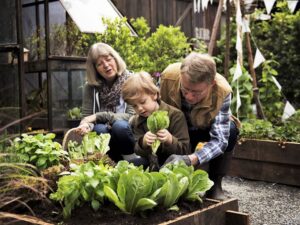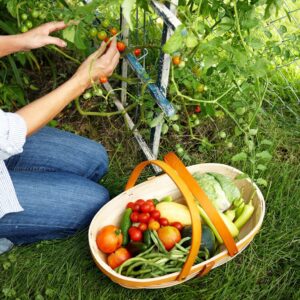The Health Benefits of Gardening
The third habit in our Simple 9© nutrition program is Eat 4 or More Servings of Vegetables a Day. The benefits of eating vegetables are endless, but the latest numbers from the CDC tell us that only 10% of US adults eat enough vegetables.
Based on that number, it’s no surprise the latest statistics from the CDC tell us the obesity rate in America is now 42% and 49% of adults have pre-diabetes or diabetes. We now see 1.7 million new cases of cancer each year. I believe these statistics came from a lot of bad habits, and not eating enough vegetables sits at the top of the list.
I often get pushback from clients who say they don’t like vegetables, or “vegetables are boring.” The best way to make vegetables taste better and more interesting is to grow your own. In fact, the benefits of gardening go beyond the nutrients in the food. Gardening has the potential to improve your health by providing access to nature, vegetables, and physical activity.
Gardening Can Prevent Heart Attacks
Research has shown that gardening can reduce heart attack/stroke risk by 30 percent for folks over 60. The physical activity acquired from gardening is as beneficial as walking for people in this age group. A survey of over 4,000 Swedish adults over 60 found that those who gardened had smaller waists, lower levels of harmful blood fats, and lower blood sugar.
Gardening is a Great Form of Physical Activity

One of the great things about gardening is planting seeds, pulling weeds, and picking vegetables forces us to spend a lot of time squatting down and getting back up. More difficult activities like raking, hoeing, and fertilizing can be demanding enough to qualify as intense physical activity, the kind we need exposure to once a week to stay healthy. Gardening forces your body into movement patterns you don’t normally do daily. That’s important because it helps maintain flexibility and mobility as you age.
Gardening Causes You to Consume More Fruits and Vegetables
You will never find a tomato that tastes as good as one you just picked from your own garden. Home grown always tastes better than store bought.
A study in 2020 involving about 4,000 US participants found that 30% of Americans have a home garden. The study also found that gardeners are less likely to be obese and more likely to meet US dietary recommendations for fruit and vegetable consumption.
Getting kids involved in gardening is one of the best ways to get them to eat more vegetables. Researchers at the University of Texas worked with 16 elementary schools to install vegetable gardens and teach classes to students and parents about nutrition and cooking. Parents in the study were amazed to find their kids wanted to eat kale. But when they grow the kale from seed and learn how to prepare it in olive oil and bake it into kale chips, they love it.
Gardening is Great for Your Mental Health
Gardening improves your mood, relieves stress, contributes to personal growth, and provides an opportunity for you to help others. A 2020 review of 77 studies on gardening found multiple links between gardening and improved mental well-being.
Spending 20 minutes in nature three times a week will significantly reduce your stress. Research has proven that just being in nature lowers cortisol levels, lowers pulse rate, and reduces blood pressure. And spending time in the sun will boost your vitamin D and can have a huge impact on reducing depression.
Also, gardening provides an opportunity for you to practice generosity. Almost anyone who’s gardened knows you will end up growing more than you use. Giving those extra vegetables away is a great way to practice generosity—which has also been shown to reduce stress and fight depression.
So How Do You Get Started if You’ve Never Gardened Before?
Gardening can seem intimidating if you’ve never done it before. The good thing is you can easily find some great resources online to point you in the right direction.

- Garden.org — The National Gardening association provides a ton of free information at Garden.org. They offer free guides for growing just about every fruit and vegetable you can imagine. You can also submit questions and get them answered for free by one of their gardening experts. One of my favorite tools on their site shows the average first and last frost dates for any zip code in the country. They also have a vegetable planting calendar that tells you the best time to plant certain vegetables in our area.
- Squarefootgardening.org — Gardening in raised beds is one of the easiest ways to grow vegetables. The biggest advantage comes from the fact that you’ll create your own soil mixture (1/3 Vermiculite, 1/3 Pete Moss, and 1/3 Compost) to put in your beds. Squarefootgardening.org provides all the information you need to begin gardening with raised beds, including detailed instructions to build your own boxes, mix your soil, and grow delicious vegetables.
- Indyschild.com — Indyschild.com keeps a running list of farmers’ markets in the Indianapolis area. You can really learn about gardening by attending farmers’ markets. It works like this: go to a farmers’ market and find someone selling good vegetables, then ask them how they grew them. You may not get all their secrets, but most farmers will happily point you in the right direction and help you get started.
So, what are you waiting on? Get outside; get dirty; and get some seeds in the ground.
Stay Strong,
Bo Railey

